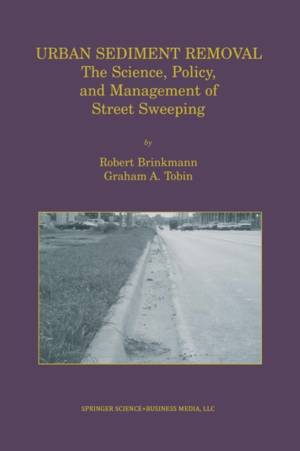
- Afhalen na 1 uur in een winkel met voorraad
- Gratis thuislevering in België vanaf € 30
- Ruim aanbod met 7 miljoen producten
- Afhalen na 1 uur in een winkel met voorraad
- Gratis thuislevering in België vanaf € 30
- Ruim aanbod met 7 miljoen producten
Zoeken
Urban Sediment Removal
The Science, Policy, and Management of Street Sweeping
Robert Brinkmann, Graham A Tobin
Paperback | Engels
€ 111,95
+ 223 punten
Uitvoering
Omschrijving
There is not an extensive literature on street sweeping. Much of the research that has been completed exists in the "gray" area of technical reports and government documents. Furthermore, a great deal of this research is locally based, and has not been widely published. Indeed, our review of the scientific literature, revealed that, while storm water quality has received a lot of attention, few academicians have been involved in street sweeping research per se. Thus, throughout our research into street we sweeper effectiveness, sweeping protocols, and sweeping practices, wished that there had been a book summarizing some of the important issues associated with street sweeping. As our frustration grew, we realized that we were uniquely poised to write such a book as our research had encompassed a variety of different projects including sweeper testing, waste management, and related storm water quality. Also, early on in this exercise, we recognized that there was a growing demand for information about street sweeping policies and management, especially for studies focusing on the effectiveness of different sweeping schedules, on waste management operations, and on non-point, pollution reduction practices associated with storm water runoff. It was abundantly clear that there was a profound lack of research on street sweeping that could assist with developing local, regional, or national policies. There was, in effect, little guidance for city managers on these issues.
Specificaties
Betrokkenen
- Auteur(s):
- Uitgeverij:
Inhoud
- Aantal bladzijden:
- 172
- Taal:
- Engels
Eigenschappen
- Productcode (EAN):
- 9781461355922
- Verschijningsdatum:
- 29/10/2012
- Uitvoering:
- Paperback
- Formaat:
- Trade paperback (VS)
- Afmetingen:
- 156 mm x 234 mm
- Gewicht:
- 272 g

Alleen bij Standaard Boekhandel
+ 223 punten op je klantenkaart van Standaard Boekhandel
Beoordelingen
We publiceren alleen reviews die voldoen aan de voorwaarden voor reviews. Bekijk onze voorwaarden voor reviews.











